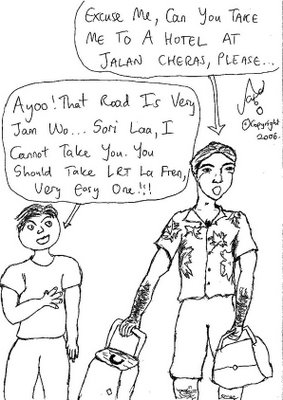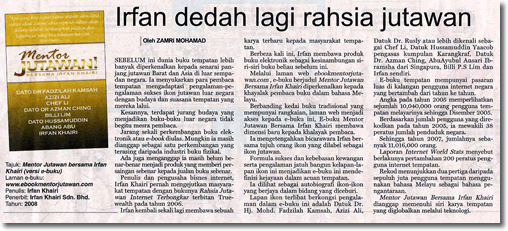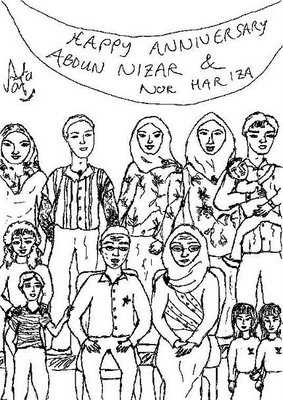... and you are one of them!
The British vs The Malay

Before departing for my studies overseas last time, I used to hear this a lot... the British considered the level of English language among Malaysian students was so perfect: the grammar, the sentence structures, the pronunciation. But when I arrived there, I found the situation to be quite the contrary. Unless you really speak perfect English with accent and all (which for some people, they can be overly doing it, as though trying to impress the locals there or something), you may find it hard to communicate with them, even though you know your English is correct.
I don't know about the US, but in the UK, people in different regions speak differently (the accent). Just like in Malaysia, people in Sabah & Sarawak speak differently from those in Johore, Penang and Kelantan. As for me, if a Kelantanese speaks with pure Kelantanese accent, I may just look at the other person blankly and just nodding my head, agreeing to something that I don't fully comprehend.
Back to conversing in English in the UK. Over there, there's a chance that if we try to speak English properly and correctly, the locals might find it to be strange instead (though not all of them of course... those in the midland regions should be all right). I've encountered a few awkward situations where I wondered if I should have just spoken in Malay in the first place. At least, it was apparent from the beginning, that we were not talking the same language huh... sigh...
Ok, enough with us trying to speak in their countries. How about when a tourist who originates from an English speaking country comes to Malaysia? They may have a culture shock, so to speak, after discovering that the English words here have been adapted to our local cultures and in some cases, local slangs; thus the term Manglish is invented. I think the same situation applies in other non-English speaking countries. Otherwise, the movie Spanglish would not have been made.
1. For Malaysians, they, especially the Malays, like to add "laaa" or "lah" at the end of sentences, especially when to stress on some points. Other typical slangs are like "eh" (used when asking questions or when being cuddly or cheeky), "haiyaaa" and "loh" (common among Chinese communities), and "ayo" (common among Indian communities). An example of how such words are used, is in the above cartoon.
2. Just like the Arab language, some letters in English words are not vividly pronounced like silencing the letter 'h' for honest.
Unfortunately (if you want to look at it that way), the Malaysians like to do everything fast. Heck! after all, what else could be the reason as to why we have so many impatient drivers out there, trying to reach their destinations as quickly as possible even if it means endangering other road users, as though by the time they get there, those places would be no longer there. Also, look how we like to abbreviate things - ABC for 'air batu campur' (a local beverage), PJ for Petaling Jaya (a city in Selangor) or the abbreviated names of people to the extent that the nicknames don't even sound anything like the real names.
And the same goes with pronunciation of some English words too. Here's an example of a conversation between a disgruntled customer (say, he's a foreigner laa ok?) who wishes to lodge a complaint via the phone to a company representative:
Customer: Look, I'm really dissatisfied with the quality of your product and would like a full refund or else, I will report to the consumer tribunal.
Representative: Sekuse me sir, please be patien. I will pass you to the officer in charge. Please hole on...
Sekuse me = Excuse me; patien = patient; hole on = hold on :)
3. Malaysians also tend to directly translate their mother tongue to English. Here's an example where a lady scolds her boyfriend for breaking his promise.
Girl: You promised to take me on a vacation next weekend!!!
Boy: Where got? (Instead of saying "When did I promise that to you?" or something else similar).
Where got? is a direct Malay translation for Mana ada? :))
4. And finally (what I can think of laaa....hehe), Malaysians LOVE rojak (a local cuisine of mixed fruits). I guess, that's why we like to lend (?) some of our words in our English conversations like the word tapau (Chinese word) which means take away (as in when ordering foods).
A rojak language can also mean speaking one sentence in English, then two sentences in Malay, followed by using words of both languages in remaining sentences. :))))))))
We Malaysians are indeed rich in diversity................
P/S: Where is the best place to learn and improve Arabic language? Care for some thoughts? Those learning programmes available in the book shops, are they reliable since we only rely largely on tapes and books? Thanks for your inputs.
Coming soon:
1. The on-going Umno Assembly has prompted me to write this article - Some lines should never be crossed and some borders should never be interfered.
2. There are two sides of everything. Tourists praise Malaysians for being polite and humble, while there are those among us who see Caucasians as being caring and loving. REALLYYYYY????
3. The net. Put up your net (literally) when you surf those websites, when you read those emails, when you receive those SMS's and when you heard/watch those news. You can read/hear/watch all you want, but filter all you can!! Other than preventing yourself from "information overload", bear in mind there are those out there with nothing to do, spreading ill meaning information that is meant to confuse us, disunite us and ridicule us.








